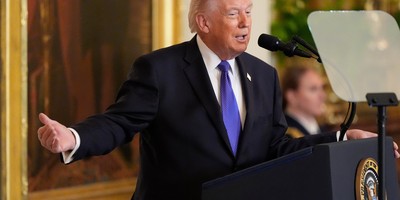Democracy and majority rule give an aura of legitimacy to acts that would otherwise be deemed tyranny. Think about it. How many decisions in our day-to-day lives would we like to be made through majority rule or the democratic process? How about the decision whether you should watch a football game on television or "Law and Order"? What about whether you drive a Chevrolet or a Ford, or whether your Easter dinner is turkey or ham? Were such decisions made in the political arena, most of us would deem it tyranny. Why isn't it also tyranny for the democratic process to mandate what type of light bulbs we use, how many gallons of water to flush toilets or whether money should be taken out of our paycheck for retirement?

The founders of our nation held a deep abhorrence for democracy and majority rule. In Federalist Paper No. 10, James Madison wrote, "Measures are too often decided, not according to the rules of justice and the rights of the minor party, but by the superior force of an interested and overbearing majority." John Adams predicted, "Remember, democracy never lasts long. It soon wastes, exhausts, and murders itself. There was never a democracy yet that did not commit suicide." Our founders intended for us to have a republican form of limited government where the protection of individual God-given rights was the primary job of government.
Alert to the dangers of majoritarian tyranny, the Constitution's framers inserted several anti-majority rules. One such rule is that election of the president is not decided by a majority vote but instead by the Electoral College. Nine states have over 50 percent of the U.S. population. If a simple majority were the rule, conceivably these nine states could determine the presidency. Fortunately, they can't because they have only 225 Electoral College votes when 270 of the 538 total are needed. Were it not for the Electoral College, that some politicians say is antiquated and would like to do away with, presidential candidates could safely ignore the less populous states.
Part of the reason our founders created two houses of Congress was to have another obstacle to majority rule. Fifty-one senators can block the designs of 435 representatives and 49 senators. The Constitution gives the president a veto to weaken the power of 535 members of both houses of Congress. It takes two-thirds of both houses of Congress to override a presidential veto.
Recommended
To change the constitution requires not a majority but a two-thirds vote of both Houses to propose an amendment, and to be enacted requires ratification by three-fourths of state legislatures. The Constitution's Article V empowers two-thirds of state legislatures to call for a constitutional convention to propose amendments that become law when ratified by three-fourths of state legislatures. I used to be for this option as a means of enacting a spending limitation amendment to the Constitution but have since reconsidered. Unlike the 1787 convention attended by men of high stature such as James Madison, Thomas Jefferson, George Washington and John Adams, today's attendees would be moral midgets: the likes of Barney Frank, Chris Dodd, Olympia Snowe and Nancy Pelosi.
In addition to an abhorrence of democracy, and the recognition that government posed the gravest threat to liberty, our founders harbored a deep distrust and suspicion of Congress. This suspicion and distrust is exemplified by the phraseology used throughout the Constitution, particularly our Bill of Rights, containing phrases such as Congress shall not: abridge, infringe, deny, disparage or violate. Today's Americans think Congress has the constitutional authority to do anything upon which they can get a majority vote. We think whether a particular measure is a good idea or bad idea should determine passage as opposed to whether that measure lies within the enumerated powers granted Congress by the Constitution. Unfortunately, for the future of our nation, Congress has successfully exploited American constitutional ignorance or contempt.

























Join the conversation as a VIP Member